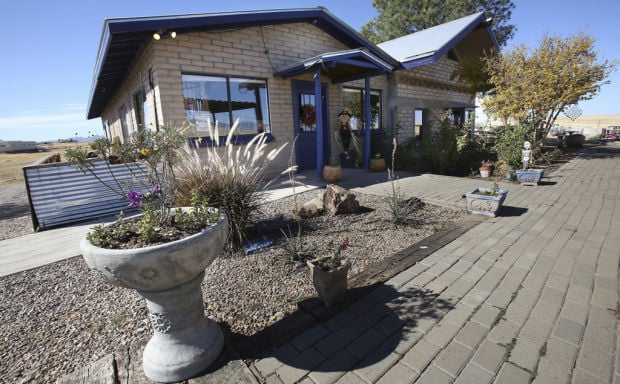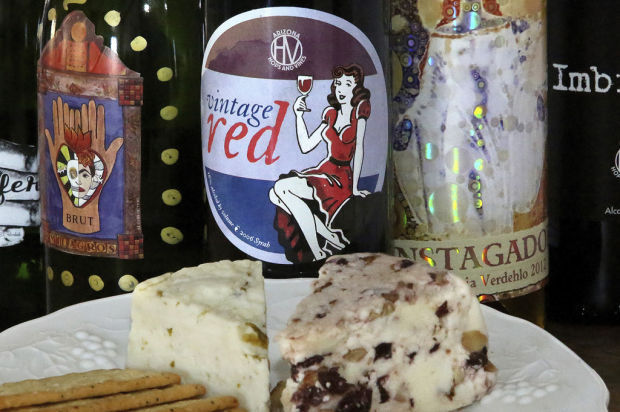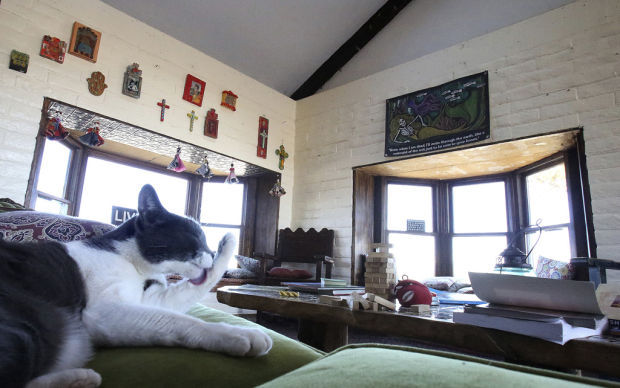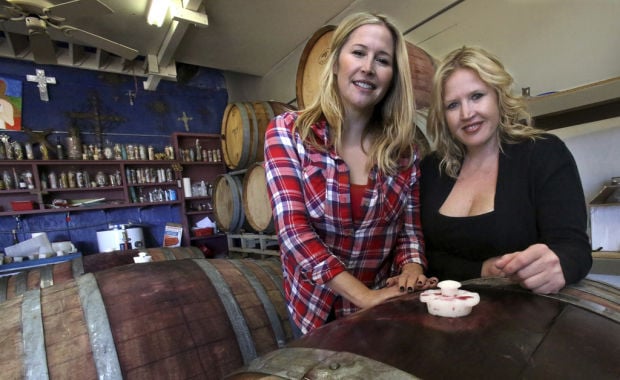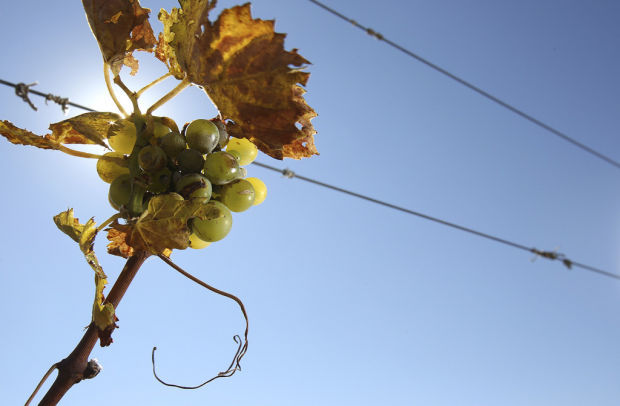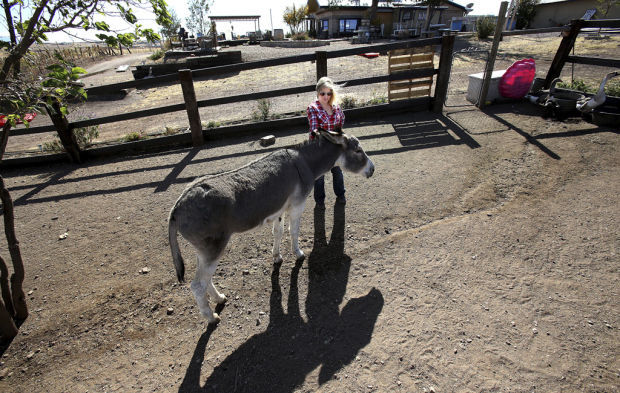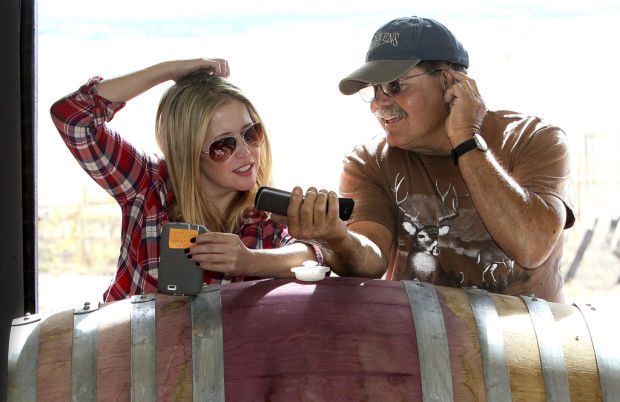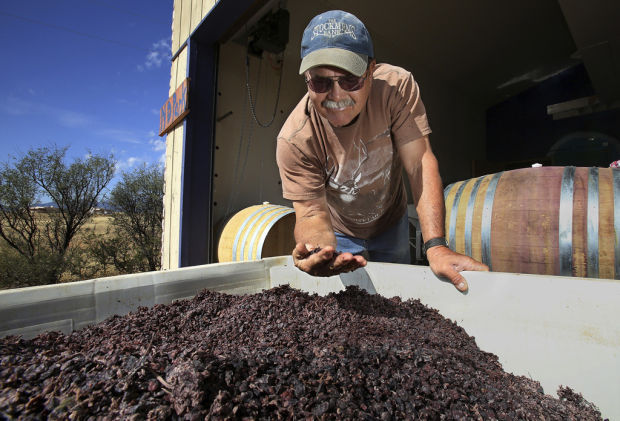SONOITA — Wine can be stuffy business, with all the swirling-in-the-glass, let-it-breathe etiquette.
Shannon Zouzoulas and her sister Megan Haller think wine should be fun.
At their nearly 2-year-old cheeky little Arizona Hops and Vines vineyard, Zouzoulas will greet you at the tasting room door first thing in the morning with an offer of a mimosa made with a sassy sparkling wine called The Fluffer. It’s a fruity vintage that — gasp, horror! — Zouzoulas has been known to slip into a blender and whip up as a slushy.
Then there’s the Drag Queen, a stubborn brew of grapes and hops grown side-by-side on the 10-acre vineyard. The result is a wine that thinks it’s a beer.
One of the unique offerings is Imbibe 2, a hodgepodge of wines from different years — including a contribution from neighboring Callaghan Wineries — all thrown together to create a vino the California natives describe as “a wine tasting in a glass.” Added bonus: It pairs nicely with Cheetos, which is Arizona Hops and Vines’ go-to palate cleanser alongside barbecue chips.
“We try to do things differently,” said Haller, 37, who tends the vineyard and makes the wine while her sister runs the tasting room and is in charge of marketing and event planning. “There are no rules.”
The sisters threw out the rule book when they launched the winery in 2011 on a shoestring budget of borrowed money, hand-me-down vines and an urgent need to prove wrong everyone — including the state of Arizona — who said they would never succeed.
“All we ever heard was it will never happen, but it never occurred to either one of us that it wouldn’t happen,” said Zouzoulas, 39.
Dreaming out loud
The sisters like to joke that they got into wine after having kids — they each have three. They were both stay-at-home moms after meeting their husbands in college and starting families. Zouzoulas and her husband settled in Maryland, where she went to school, and Haller moved to Vail with her husband, who was with the Border Patrol.
Whenever they got together, they daydreamed aloud over wine about buying a piece of land and planting a vineyard. It was the kind of what-if conversation sisters have when they feel they’ve fallen into a rut. On the sidelines, their husbands pooh-poohed the idea, telling them it was a pipe dream that they would never see through.
But the dream began coming into focus when Haller started working with Sonoita area vineyards in 2007, first as a volunteer during grape harvest, and then as an assistant to the winemaker. In the span of a few years, she bounced around from winery to winery, learning all aspects of the operation from vine management to pouring in the tasting room. She also took online classes from the University of California-Davis, one of the country’s foremost viticulture programs.
On her drives through Sonoita, she passed a ramshackle house on a hill in the middle of picturesque grasslands. “If I could just win the lottery, I would buy that house and turn it into a vineyard,” she told herself.
One day in April 2010 on a family camping trip, Haller decided she was done dreaming; it was time to act. Her epiphany came right after her husband told her she should give up the idea of a winery. “It is never going to happen,” he told her.
“That was the moment that I decided I had to do it,” she recalled. “It was the defining moment for me when I said I absolutely have to get going and move forward on this.”
She enrolled in a course on writing a business plan and started looking at how she could buy that house on the hill.
Zouzoulas had her own epiphany not long afterward and thousands of miles away. On a road trip from Arizona back to Maryland, she and her husband had a falling out when she told him she wanted to stop at a museum in St. Louis. He wanted to continue on home, but she insisted and he finally relented.
One of the first things she saw in the museum was a quote from Jack Kerouac’s generation-defining novel “On The Road” about the “mad ones” who grab life and hold on for the ride just to experience actual living. It spoke to her. When she got home, she called her sister and announced that she and her kids were moving to Arizona in a few months, after the school year ended.
Zouzoulas divorced her husband. Haller is still married, but separated.
Being single freed them.
Getting started
The house on the hill was built in the mid-1970s. It had seen better days. It stood vacant for five years, paint peeling, the grasslands overgrowing any evidence of the previous owners’ landscaping.
But Haller and Zouzoulas saw its potential. A large garage out back would be perfect as the winery. The front half of the house, with some walls knocked out, new flooring and fresh paint, would make a rustic tasting room. The bedrooms could be converted to offices.
They didn’t have the $300,000 asking price and neither was in a position to get a loan. They were unemployed, after all. So the sisters turned to their parents.
“They fought us on that one,” Haller recalled. “They said we needed a business plan and to show that we had the income to pay the mortgage before they would agree to do it.”
The sisters recruited a couple of investors: one was a longtime friend, the other was a tasting room customer of Haller’s who promised he would invest with her if she ever went out on her own. Haller drafted the business plan — she was one of a few people who saw the course to its finale, she boasts — then they returned to their parents, who took out the mortgage.
The sisters bought the house in January 2011 then set out on a whirlwind of rebuilding and renovating. A team of University of Arizona students volunteered to design a patio out back and the sisters laid the flagstone themselves, slab by slab. They built a wooden deck on the side of the house overlooking the vineyard. They renovated the spacious garage to make a winery, with one half devoted to cellaring and the other to making the wine. And they converted a small tool shed into the “Sober Shack,” a room where kids can make soda and snacks while their parents sample the wines in the tasting room.
That April, Haller and Zouzoulas planted the vineyard in the front yard — three acres of vines that the sisters painstakingly grew from cuttings Haller gathered months earlier while working in the fields of other wineries. Each night Haller would come home with a car full of vine scraps that she and her sister would trim and water with hopes that they would sprout roots. Most of her Sonoita winemaking colleagues were encouraging, but some had their doubts that the vines would take.
“We planted 8,000 cuttings and 90 percent of them took,” Haller said.
“When people say no to us, it doesn’t even register on my brain. I don’t hear it; we keep plugging ahead,” added Zouzoulas.
Hops, skips
and legal landslides
Haller had decided from the start that she would grow hops on the vineyard. There are pockets on the spread that slope downward, creating low-lying patches that can make wine grapes vulnerable to wintertime freezes. But hops are sturdy, known for being tolerant of varying weather conditions including frost.
What the sisters did not know when they planted an acre of hops among the wine grapes in spring 2011 was that state law prohibited operating a winery and brewery on the same property. In essence, just planting the hops could be seen as breaking the law.
Their hops were already thriving when a neighboring winemaker told Haller about the law.
Zouzoulas said they at first tried to find loopholes; there were none. They thought about fighting the law, but they had no idea where to begin until lobbyist Mark Barnes called early this year. He had read about them and offered to lobby state lawmakers on the winery’s behalf to change the law, and he would do it for free.
Barnes was able to get a bill introduced in the Legislature in March and by early April, Gov. Jan Brewer signed it into law, overturning the ban on breweries and wineries cohabitating.
“A lot of people said there was no way to open (state) alcohol laws because (lawmakers) are so touchy and they just won’t do it. … Everyone was shocked including our own industry that we were able to turn that over in almost three months,” Haller said.
Arizona Hops and Vines has a brewing license application pending and hopes to launch the brewery in March. If all goes as planned, the first craft brew will be ready in time for the winery’s annual Oktoberfest next fall.
The first pour
It takes two to three years for wine grapes to mature to the point where you can begin making wine. So the sisters bought fruit from other vineyards to make their first batch of wines in 2011.
Haller, the winemaker, created six wines that first year; they were released in spring 2012 when the tasting room opened.
The sisters gave their wines cheeky names: “Summer” for a white wine boasting “notes of green apple, passion fruit, pineapple and a pleasurable ‘fresh’ flavor.” “First Crush” was a complex dry rosé. “Moxy,” made from Graciano grapes, earned them a gold medal from Santa Cruz County. “Imbibe” is their voluptuous California petit verdot. And “Zinnerpeace” is a zinfandel with hints of blackberry or blueberry jam, pepper, cocoa and vanilla.
Then there’s the naughty sparkling wine. “The Fluffer.” Some Arizona winemakers were quick to dismiss it as lightweight and frilly, not the sort of wine that makes a statement of serious winemaking. But customers loved it, buying up inventory faster than the sisters could bottle it.
“The Fluffer is just a fun wine,” Haller said. “It’s a good wine. It’s well balanced. It’s sweet, but not overly sweet. It’s crisp.”
The Fluffer quickly became the main attraction at the tastings and the elaborately themed events that the sisters started hosting a few months after opening. These are not your cheese and crackers wine tasting parties. They are celebrations, from the admittedly inappropriate Manly Cup Air Hockey Tournament, held in mid-January — the winners take home a gold, extra-large jockstrap — to the hugely popular Bad Decisions — a festival of bacon, beer and wine held in August. The inaugural Bad Decisions in 2012 brought in 125 people; the crowd swelled to 850 this year, and more than 500 of those people camped overnight at the vineyard.
“We are trying to change the idea behind wine,” Haller said. “I think you can have a good time and still be taken seriously.”
“To me, personally, my biggest hurdle is just trying to show people that we are serious about what we are doing — making great, quality wines here,” she added.
“We get labeled the fun winery a lot of times, and we are. And that’s important to us. But we are trying to make a good, quality wine product and take the vineyard seriously.”
“The reality is if our wines don’t speak for themselves … we won’t sell anything,” Zouzoulas said.
Arizona Hops and Vines sells all of its wines on site or through its website. Bottles average $23.
Since opening the tasting room, in March 2012, the sisters have sold 1,500 cases of wine — roughly 18,000 bottles, Zouzoulas said. The biggest seller: The Fluffer.
“The first impression is that we’re fun, but once we get them coming through the door, they come back because of the wine. And our craziness,” Zouzoulas said.
Making wine
more user-friendly
Arizona Hops and Vines gets referrals from other wineries, which tell people that is where you go for fun. Zouzoulas and Haller don’t disappoint.
Connoisseurs dressed in Tucson golf-course casual and novices wearing jeans and T-shirts get sucked into Zouzoulas’s barmaid rhythms as she pours from their six vintages. She is quick with a quip in between explaining what they are tasting in terms that disarm the veterans and enlighten the unlearned.
This is a place where you can bring the kids and not worry that they will be bored. The Sober Shack, the kids-only space, Zouzoulas’s and Haller’s children will supervise, make soda and snacks and play games. There’s also a petting zoo about 500 yards from the flagstone patio populated by Clint Eastwood, the cantankerous donkey who’s known to bite; Kevin Bacon the inappropriate pig; Donald Trump the perverted duck; Henry and Matilda the geese couple; five sheep called the Wailers because they live in the same pen with Bob Marley the fainting goat; and Lola the Australian shepherd, who keeps everyone in line. They had a turtle named Harriet Tubman, but she dug an underground railroad and escaped.
Haller will lead visitors on a tour of the winery, showing them the bins of fermenting wine at its various stages — from newly crushed to wine ready to be barreled. Wooden barrels adopted by loyal customers — they pay for the barrel and loan it to the winery, which returns it after the wine is bottled — line the walls. Shelves on another wall are filled with devotional candles representing everything from Buddhists to Catholics. You can never have enough karma, Haller will tell you.
Once every couple months, Zouzoulas and Haller lay down the welcome mat for some elaborate event. On Saturday, they introduced their holiday glühwein during “Deck the Halls,” a five-hour celebration of wine and Christmas cookies pairings, holiday music, an ugly Christmas sweater contest, food trucks and a holiday market. Santa Claus also swung by.
At the annual Speakeasy in January, Hops and Vines will release its newest vintage “The Lobbyist” — in honor of Barnes. Later in January, they will host the second annual Manly Cup followed in February by Chocolate Love, which pairs wine and chocolate served by shirtless waiters.
The biggest event of next year will come in the fall, when Arizona Hops and Vines releases its first estate vintages, wines made by grapes grown at the vineyard. Expect the party to be epic, but don’t be surprised if you see Haller and Zouzoulas shed a tear or two.
“It’s hard to grow grapes in Arizona and it’s hard to make wine in Arizona,” Haller said. “It is not just something we are doing for fun. It is definitely my passion. ... It’s a work in progress. We’re constantly trying to see what we can do.”


